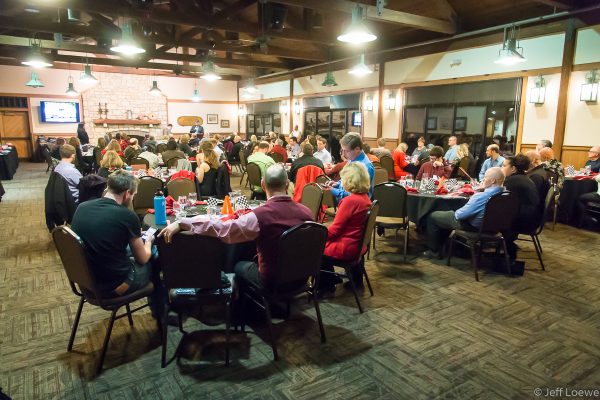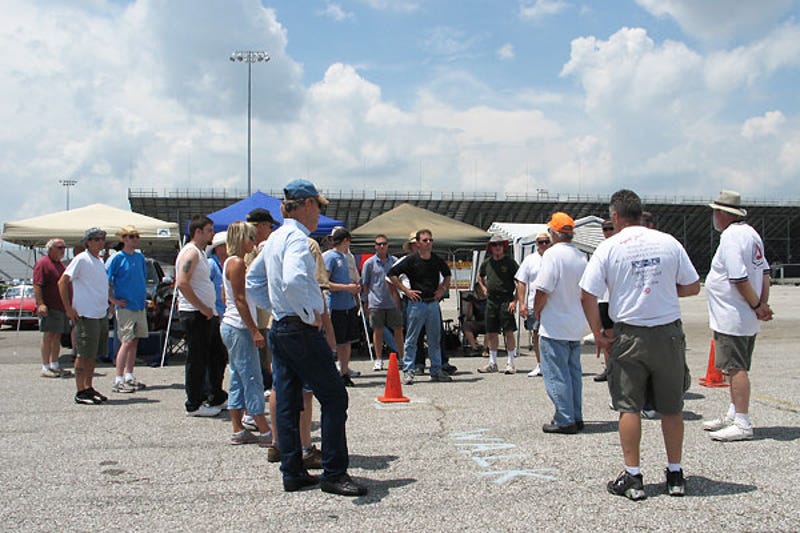Last week, I focused on thanking a bunch of friends and mentors that helped me on my way. Over the years, tons of people have helped me in motorsports – from what tracks to go to first, to what cars are most competitive, to advice on tire pressures to just do it advice.

This week I’ll give my thoughts on how I chose to reach out to competitors and clubs to get a better handle on where to jump in. One thing to keep in mind always is that you are never too old to start competing.
When you’re looking for advice, you will sometimes hear that you’re starting too late because xyz started karting when they were 5, they’ve been Autocrossing since they got their license, you’re too tall, you’re too this, you’re too that. The Alarm channeling Woody Guthrie during Rescue Me from Electric Folklore Live is playing in my head right now!
Everybody starts sometime. Don’t listen to anyone who tells you that it’s too late. Just because they’ve given up on their dreams doesn’t mean that you should let them crush yours – as a fortune cookie once told me. Those who would crush your dreams have given up on theirs… 🙂
From time to time, you’ll find people like this throughout the industry. When you get this kind of negative feedback, ask yourself if you want them to determine your future or do you want to? Me, I want to determine my own future.

That said, I did listen to that kind of bad advice a few times and let it hold me back for several years. I wanted to race open wheel cars when I started road racing. I had seen a beautiful Swift DB-1 one summer in the SCCA Display at the Chicago Autoshow and it made quite an impression on me. I started asking around about single seaters. I had NO IDEA how expensive a DB-1 was. It might as well have been $1M at that time in my life! Very pretty car though. Someday, I’d still like to try one out.
Ok, back to the story.
I asked around and expressed my interest in starting out in single seaters. I had a couple people I trusted tell me that I was too old and too tall for single seaters. I was in my early 20s. I had never karted. I was too far behind the curve to start now. This was pretty crushing. What they didn’t know is that this had reinforced a comment I got from the Air Force in high school that I was too tall to fly fighter planes. I trusted that they knew what they were doing and accepted it as a fact. 6’2″ = no fighter pilot.
Many years later after the “too tall for fighter planes” and “too tall for single seaters” comments, I met an F-16 Pilot who was 6’5″! I realized at that moment, that on that day, years ago, I had run into a college recruiter on a bad day. I also realized that when people I trusted told me I was too tall for a single seater, maybe they were wrong or maybe they were worried I couldn’t afford it and were trying to save me the pain.
The WTF part of my brain kicked in and I started looking up F1 driver stats – I was just a little taller than Gerhard Berger!! I had listened because I thought they knew. From then on, when someone replied to a question of mine with a “that’s impossible” type of response I’d trust them, but verify. From time to time, it still happens. But, now I check around a little more – especially if it’s something I really want.

Let talk about the positive. What do you want to learn when you are trying to get started in road racing? First off, we talked a little about one path – getting started in Autocrossing. There are many others, but let’s start there. How do you find an Autocross or road racing club? How do you find anything today – search online until you find one or more clubs in your area. Each club will have a meeting and competition schedule posted.

It can be super helpful to go to club meetings – meet the people, make connections, introduce yourself as somebody who is trying to learn about the sport and maybe try it out. You’ll be amazed how many people will give you advice on where to start. One of the neat parts of this right now is that most of us get all stir crazy over the winter and these wintertime meetings are a great place to bench race and hang out.
I decided to look up our local SCCA club and found out through them that there was a great autocross club in town – Minnesota Autosport Club and they had a meeting that week.
I found out where the meetings were in the basement of an older Italian restaurant and quite a drive from my apartment. Turned out to be good food, good beer and great company. I felt pretty weird walking in. For just one moment, I held my hand up to the door and right before I pushed it open, I almost didn’t. I had no idea what I was walking into, I realized I wouldn’t know anybody. Heck with it, I thought. I’ve driven down here. I walked right in and there were about ten or so people there. They all seemed to know each other. I was obviously new. I spoke to a couple of people and explained that this was my first time at one of these meetings, and they opened right up. In less than an hour I felt like I was with an extended family.
This group of guys and girls knew F1, knew Indycar, knew about racing and autocrossing. They had more than just racing knowledge, they knew cars. They knew a lot about cars. These were my kind of people! I started asking my questions about how did it all work – when do you need to arrive for an event, is my little CRX ok to use, what do you need to bring with you, what do you wear? It was Minnesota, so pretty much shorts to a ski jacket could be required depending! 🙂 They were really great, a couple of those people I met that first night have become lifelong friends of mine.
Later that summer I went to my first event – I think in June or July. It was super hot, I had no idea what I was doing, but I knew a couple of people from that meeting and sought them out to try to get myself situated. I think I missed a working session and got some grief for it. Nothing major, just good-natured stuff, but with a clear message – you need to work to play. It was a great time. I met Todd Freeman and Randy Williams, Rob Mackert, Pat Doyle, Jerry Winker, Phil Ethier and many more that day. It was the start of several summers of autocrossing that built up lifelong bonds of friendship. I found out that during fun runs, you could ask to go for a ride with pretty much anyone. You could learn so much. Style and pace – as I mentioned before – were never more visible than during fun runs.
What’s this mean for you?
Next, try to find an event near you go and watch – you’ll be amazed how many people you will meet! Also, you’ll see how the event flows, learn how to help out and learn if you want to jump in. As you are watching, you can be learning what class your car will run in, how other people avoid the cones, that kind of thing.
The really cool bit is this. Racers want the sport to grow and lots of people are willing to take the time to help out newbies. All you have to do is ask. Just like anything, be smart and pay attention to what’s going on around you. Try to ask for advice when things are quiet and people aren’t thrashing.

What do you want to ask? Ask things that are difficult to find on Google. You can find the schedule and pricing and regulations online pretty easy for starters. Try asking about what’s it like at an event? Anything I should bring with me? Where should I get my helmet? Who’s a good person to ask questions of? Do I need a lap belt? Where is a good tire shop. Does anybody else compete in the same car?
If you haven’t already, ask about autocross schools. Do they have one? If so, these schools can provide an amazing amount of track time with people who want to help you. Sign up.
If you’ve decided to go watch first, you should plan on attending the drivers meeting. Driver’s meetings are a place to learn how the event works and what the organizers are focused on. Afterwards ask the steward or a worker if you can help out – they are always looking for people to pick up cones at an autocross. If you can work the course, it’s a great way to be close to the action and see what others are doing. When you do compete, typically you will be scheduled into a run group and a worker group. So working at events is a good habit to get into right away. Events don’t happen without workers. Something to remember from here on out.

If you’ve decided to go right into Road Racing, definitely create a plan to go watch some regional events. Try to find out during the club meetings if anybody needs an extra pair of hands. Most times, the teams are all volunteers and will welcome the help. Above all ask lots of questions – what am I getting myself into – you’ll find people with all kinds of passions – road racing, rally, time trial, Time Speed Distance rallying, autocrossing, the list goes on. Club meetings are a good place to find the people who’ve been around for a while and tend to give pretty good advice. We’ll explore diving right in a little bit later in this series.
Next week, I’ll talk about how I prepared for my first events – both Road Racing and Autocrossing. Lots of things to learn from and more things to avoid. And as an added bonus, we’ll have a guest blogger or two share their perspectives…
